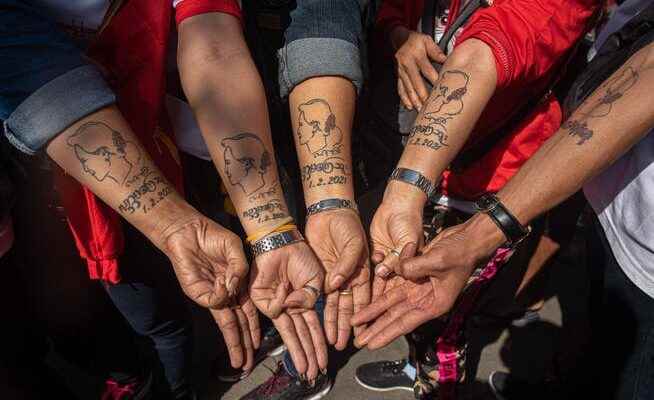Aung San Suu Kyi has been sentenced to a total of 33 years in prison. The military junta wants to banish the face of the Myanmar democracy movement from public view and silence it forever.
Supporters of the imprisoned Nobel Peace Prize winner Aung San Suu Kyi demonstrate in front of the Myanmar embassy in Bangkok.
A military court has sentenced Aung San Suu Kyi, the icon of Myanmar’s pro-democracy movement, to a further seven years in prison. It may have been the last process that the military junta brought against the 77-year-old. She had previously been found guilty of 14 charges and sentenced to 26 years in prison. Suu Kyi will be at a a total of 33 years in prison likely to die in prison if the ruling military, known in Myanmar as the Tatmadaw, is not overthrown first.
#Myanmar: Guilty verdicts against Aung San Suu Kyi underline the campaign of persecution faced by pro-democracy activists & dissidents. We appeal to de facto military authorities to stop the repression & to release all arbitrarily detained individuals.
— UN Human Rights (@UNHumanRights) December 30, 2022
International media locked out
The trial on Friday before a prison court included five counts: Suu Kyi had been accused of renting, buying and selling Maintenance of a helicopter behaving corruptly and embezzling state funds. Your lawyers want to appeal. They will have no chance of success. International media were not allowed to attend the trial in the capital, Naypyidaw. Suu Kyi’s lawyers were also forbidden from speaking to journalists.
In the trials, which have been dragging on for almost two years, Suu Kyi had previously been convicted of illegal possession of walkie-talkies, violations of corona measures and electoral fraud. She has always denied all allegations.
In Myanmar, the Tatmadaw staged a coup against the democratically elected government on February 1 last year and then arrested leading politicians. In addition to Aung San Suu Kyi, Myanmar’s democratically legitimized President, U Win Myint, was also sentenced on Friday to seven years in prison for corruption. This sentence is in addition to his already five-year prison sentence.
The military junta has so far failed to get the country under control. The National Unity shadow government, which works underground and is made up of elected parliamentarians, estimates that the Tatmadaw controls less than half of the country’s territory. Above all, the regions along the borders are dominated by military units from different ethnic groups. Even in central Myanmar, the heartland of the junta, the regime is under pressure for attacks.
Bad image
Suu Kyi is the daughter of the Myanmar independence hero General Aung San. He had negotiated the independence of the Southeast Asian multi-ethnic state; Myanmar was part of the British Empire between 1824 and 1948. However, he was not to reap the fruits of his labor: he was assassinated a year before Myanmar gained independence. His daughter was two years old at the time.
In 1962, the military seized power in a coup d’état. Suu Kyi followed her father and became an icon of the Myanmar democracy and freedom movement in the fight against the Tatmadaw. She paid a high price for it: Before her release in 2010, she had for almost 15 years been under house arrest. In 1991 she received the Nobel Peace Prize for her non-violent struggle against the Tatmadaw.
However, their international reputation suffered after the democratization process that began in 2010. At the end of 2019, she defended the brutal crackdown by the military against the Rohingya Muslim minority before the International Court of Justice in The Hague. Thousands were murdered, hundreds of thousands fled to Bangladesh.
However, Suu Kyi remains the face of the democracy movement in her home country. With the 33-year prison sentence, the military junta is also pursuing the goal of banning her from public view until her death and thus silencing her.
Seven students sentenced to death
Figures from the human rights organization Assistance Association for Political Prisoners show how ruthlessly the Tatmadaw is acting against its own population. At least 2,685 people have been killed and nearly 17,000 imprisoned by the military junta since the coup. The UN refugee agency assumes that around 1.1 million people have been displaced.
DAILY UPDATE 29/12/22 DAY 697
2,685 killed (+3)
16,651 total arrests (+16)
13,167 still detained (+11)letter https://t.co/KpboxHUucS
totally arrested https://t.co/p0jxeNOAHS
still detained https://t.co/z2M1vad8Zx
killed https://t.co/Qp1eDlO4Se
released https://t.co/sEbb7u2aLs pic.twitter.com/gVcfsikM2Q— AAPP (Burma) (@aapp_burma) December 30, 2022
For the first time in four decades, the regime is again implementing the death penalty: in July, four activists from the democracy movement were executed. And a month ago, seven students between the ages of 22 and 24 were sentenced to death. They had no legal counsel and there was said to have been no public hearing in the case, the government of national unity said in a media release.
